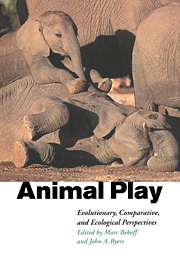Book contents
- Frontmatter
- Contents
- List of contributors
- Introduction
- 1 The evolutionary origins of play revisited: lessons from turtles
- 2 Play in common ravens (Corvus corax)
- 3 Object play by adult animals
- 4 Kangaroos at play: play behaviour in the Macropodoidea
- 5 Intentional communication and social play: how and why animals negotiate and agree to play
- 6 Structure-function interface in the analysis of play fighting
- 7 Sparring as play in young pronghorn males
- 8 Squirrel monkey play fighting: making the case for a cognitive training function for play
- 9 Self assessment in juvenile play
- 10 Biological effects of locomotor play: getting into shape, or something more specific?
- 11 Neurobiological sustrates of play behavior: glimpses into the structure and function of mammalian playfulness
- 12 Play as an organizing principle: clinical evidence and personal observations
- Index
Introduction
Published online by Cambridge University Press: 20 November 2009
- Frontmatter
- Contents
- List of contributors
- Introduction
- 1 The evolutionary origins of play revisited: lessons from turtles
- 2 Play in common ravens (Corvus corax)
- 3 Object play by adult animals
- 4 Kangaroos at play: play behaviour in the Macropodoidea
- 5 Intentional communication and social play: how and why animals negotiate and agree to play
- 6 Structure-function interface in the analysis of play fighting
- 7 Sparring as play in young pronghorn males
- 8 Squirrel monkey play fighting: making the case for a cognitive training function for play
- 9 Self assessment in juvenile play
- 10 Biological effects of locomotor play: getting into shape, or something more specific?
- 11 Neurobiological sustrates of play behavior: glimpses into the structure and function of mammalian playfulness
- 12 Play as an organizing principle: clinical evidence and personal observations
- Index
Summary
Like many other beautiful things, play is ephemeral, and often difficult to study. Play typically occupies a small part of an animal's day, and in most species, occurs only during a circumscribed part of juvenile life. Other types of behavior are more approachable and more forgiving. To study foraging in pronghorn, one can show up at just about any time of day. Missing a week or so of data is not a problem: one can always get more samples, because the animals are always foraging. In contrast, to study play in this (and other) species, one must be prepared to start observations at 5:00 a.m. each day. A missing week means that about 15% of the behavior is missed. Behavioral development is always more difficult to study than adult behavior, and play is more difficult to study than most other aspects of behavioral development. Nevertheless, play is receiving increased attention from many students of behavior studying an increasing number of different taxa, and interdisciplinary efforts are beginning to pay off. It also is becoming clear that a detailed understanding of play allows for strong insights into other aspects of behavior and social ecology. This book, which grew out of a symposium organized by Marc Bekoff and Robert Fagen for the 1996 Animal Behavior Society meetings in Flagstaff, Arizona, presents the thoughts and recent empirical results of many of the leaders in play research. We have not broken down the volume into distinct sections because of extensive overlap among many of the essays, overlap that compels researchers to continue broadly comparative and evolutionary research in this exciting area.
- Type
- Chapter
- Information
- Animal PlayEvolutionary, Comparative and Ecological Perspectives, pp. xiii - xviPublisher: Cambridge University PressPrint publication year: 1998



